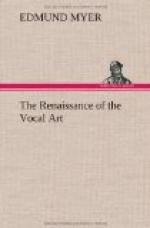The coming school, or system, of the twentieth century will undoubtedly find its form, its power, its expressional and artistic force and value, its home, its life, in America. The old country is too much in the toils, too much in the ruts of tradition; hence natural forces are suppressed, and artificiality reigns supreme in the training of the voice. While this is not true in regard to the strictly aesthetic side of the question, it is painfully true as far as the fundamental principles of voice development are concerned. Of course we are glad to say there are bright and shining exceptions to this rule in all lands, but to the new country we must undoubtedly look for the new school.
So far the world has produced but two great teachers. The first of these is Nature; the second is Common Sense. Nature lays down the fundamental principles of voice; Common Sense formulates the devices for development according to these principles. Therefore we say, Go to Nature and learn of her, and use Common Sense in studying and developing her principles. The nearer the approach to Nature, the higher the art; hence the new school must be founded upon artistic laws which are Nature’s laws, and not upon artificiality.
The coming school must teach the idealized tone. The ideal in its completeness means the truth,—all the truth,—and not, as many suppose, an exaggerated form of expression. The truth in tone, or the idealized tone, is beautiful and soulful, and demands for its production and use all the forces that Nature has given to the singer,—physical, mental, and emotional or spirituelle. Unmusical, muscular tone is not the true tone. It contains much that it should not have on the physical side, and lacks much that it should have on the spirituelle. As a rule, it means nothing; in fact, it is often simply a noise. The idealized tone always represents a thought, an idea, an emotion; it is the expression of the inner—the higher—man; it is, in reality, self-expression.
“The human voice is the most delicately attuned musical instrument that God has created. It is capable of a cultivation beyond the dreams of those who have given it no thought. It maybe made to express every emotion in the gamut of human sensation, from abject misery to boundless ecstasy. It marks the man without his consent; it makes the man if he will but cultivate it.”
The coming school must be founded upon freedom of form and action, upon flexible bodily movements, the result of vitalized energy instead of muscular effort. There must be no set, rigid, static condition of the muscles. Artistic singing is a form of self-expression; and self-expression, to be natural and beautiful, must be the result of correct position and action.
The first principle of artistic singing is the removal of all restraint. This is a fundamental law of Nature and cannot be changed. Under the influence of direct local muscular effort, the removal of all restraint is impossible. Hence the coming school must be based upon free flexible action. In this respect it will be much like the old Italian school, except that it will be as far in advance of the old school in the science of voice as the twentieth century is in advance of the eighteenth. It must also be far in advance of the old school in the devices used to develop the fundamental principles of voice.




